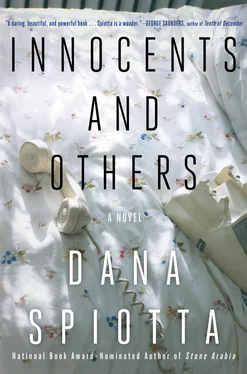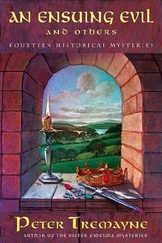* * *
Things I now had to figure out after my lie:
1. NYU at the end of August — Can I defer? By when? Would I just inform my mother that I had deferred, after it was done, a fait accompli? Yes.
2. Mailing address. My mother will want a mailing address. Can you get a P.O. box without being there in person? And then forward the mail?
3. Ditto for phone number. However, I can say there is no phone, I will call you from a pay phone once a week.
4. Not to be seen lurking about Los Angeles by parents, friends of parents, friends.
* * *
I moved into his Brentwood house with one suitcase, five notebooks, a box of videocassettes, and a stack of paperbacks (including Spectropia: Or, Surprising Spectral Illusions Showing Ghosts Everywhere and of Any Colour , a reproduction of an 1864 novelty book of optical illusions that gave my film collective its name). I parked my Rabbit in the garage, closed the garage door, and didn’t take it out again for nine months.
I had my own room, because of the times he needed to sleep by himself. But I spent many nights with him. He worked, mostly writing screenplays and treatments, and I read on the couch, screenplays or whatever I found on his shelves. I read Red Harvest by Dashiell Hammett and I read all the plays of Shakespeare. I read Swann’s Way (in translation), several Booth Tarkington novels, and I read a tattered paperback of Jealousy by Robbe-Grillet. There was only one thing I missed. I wanted to watch movies with him. The Brentwood house had a mini screening room, with a projector for films but also a VCR and a videodisc player. People sent him packages of movies, and many of them sat unopened. He rarely wanted to watch films. Later I would come to understand why, but at this stage in my life I needed to watch everything. This small difference in appetites was my only real complaint. He didn’t stop me from watching them on my own, but I wanted to do it with him. I longed to watch movies — black-and-white movies, Technicolor movies, glistening silent movies, short and long movies, old and contemporary movies, funny slapstick movies, deep subtitled movies, glorious American movies — in the dark, with him. I wanted to share that love with him.
On one of those special nights when he did want to see a film, we watched a hand-marked videotape of Terrence Malick’s Badlands. He asked me if I’d seen it and I pretended I hadn’t because I didn’t want to spoil the fun of his introducing it to me. It’s the story of two American kids, Kit and Holly, who calmly fall into a killing spree as if it were a Sunday matinee. We watched, but he didn’t say anything as he watched. I was disappointed. I wanted him to point out what he thought worked so well in the film. I wanted him to say, instructively, knowingly, “See how he uses long shots? Kit gets farther away from us as the film progresses.” But he did not.
There is a scene in which Holly uses a stereoscope and we get her point of view as she looks at photos. We hear her voice-over as she looks at the hovering vintage images of strangers and wonders:
“It sent a chill down my spine, and I thought, where would I be this very moment if Kit had never met me?… Or killed anybody? This very moment… If my mom had never met my dad? If she’d of never died?… And what’s the man I’ll marry going to look like? What’s he doing right this minute?… Is he thinking about me now, by some coincidence, even though he doesn’t know me? Does it show on his face?”
This:
I used to have a View-Master with various “sets” of viewing reels that each contained twelve related photo slides. You pushed the plastic-and-cardboard reels into the View-Master and clicked through the illuminated photos. I had the Wonders of the World set. I looked at those a lot, but the ones I loved best were the slides of the Apollo landing. The capsule tiny and glowing on the screen. The men fragile and unprotected in their tinfoil suits. I imagined climbing into that capsule, and being the first person to do it, shooting past the clouds, the ship burning away, and then the world beneath me. Would I be brave enough to do it? What did they think about, the very first time they shot into space?
But also this:
Holly didn’t love Kit anymore, and the movie shows us that through Holly’s fantasizing about her future husband, obviously not Kit. It shows us how dreamy and self-centered she is, and it shows us the flatness of her moral imagination. Part of it is in Holly’s monotoned-but-childish recitation, and part of it is in the cheerful drum-churn of the soundtrack.
And this:
While I understood the art of Malick’s construction, I felt — like a revelation — that I was Holly, unrealized, my future uncertain, all possibility and no accomplishment. I had only dreams and the childishness of yet, yet, yet. My dreams not of future husbands, but of making a film like this one, a film that implicated the viewer even as it delighted her. I blinked and tears blurred my view despite the fact that the filmmaker had gone to great lengths not to create a feeling of emotional sympathy with Holly and Kit. I blinked but I did not wipe my eyes; my boyfriend didn’t need to know I was crying. What a mystery the way things act on us, like secret messages just to you as you sit in the dark. We watched the film together, but my feelings were private, unshared and unspoken.
We saw films together only a handful of times. Much more often I would see a movie on my own after he fell asleep. Sometimes I watched a video or I would watch what was on the Z Channel. But just as often I would get stoned and look at reruns of Rod Serling’s creepy ’70s TV show Night Gallery. One night, when very stoned, I watched a plant-loving Elsa Lanchester grow out of the ground after she refuses a developer’s insistence that she move. He kills her, and her revenge is to come back as one of her plants. It terrified me and I had to sneak into his room. I startled him as he slept. My plan was to sleep near him, not wake him. But his breath caught and he sputtered awake.
“What’s wrong?” he said in a stern rasp.
“Nothing, I’m sorry.”
“It’s the middle of the night, Meadow.” He sighed.
“I’m so sorry.”
“You can’t do this to me. I’ll be up for hours.” He hoisted himself up on his pillows and rubbed his eyes.
“I was scared,” I said, and I detested my own words as if someone else had spoken them. Then I stood there and waited for him to soften or explain. Instead he pulled the chain on his fringed reading lamp and picked up a book from his bed table. He opened it and began to read. I waited for him to look up or speak but he did not. Finally I went to my own room. That was the only time I remember him getting angry with me. Or that is the angriest he ever got, as far as I was concerned.
I’m not complaining, though. He was a great companion. He recited Shakespeare. He spoke it so beautifully in his deep, resonant voice. Words seemed to linger in the air after he stopped speaking. He had a precise, actor-trained memory — nothing I said to him was ever forgotten. He wove every moment into the last moment, never stopped connecting things. I think I will never get over what it was like to be with someone who remembered everything. He could make a fork disappear into the air with a wave of a napkin and the lift of an eyebrow. He talked as he worked his magic and he revealed his trickery, which only makes the trick work better. He never bored me.
One of the best things about him was his letters. He wrote love letters to me. I found them in my books. He would leave for the day, and I would read about my lips, my laugh, my gentle touch. My long legs in shorts and loose socks. Yes, mostly they were about my body, but a body is part of you, there is no getting around it even if you want to. Besides, I liked the attention to my body details. Strange as it seems, I hadn’t had that before. All my life I had felt like a brain with two incidental arms and two useful legs growing out of it. For whatever reason, boys my age never approached me.
Читать дальше












